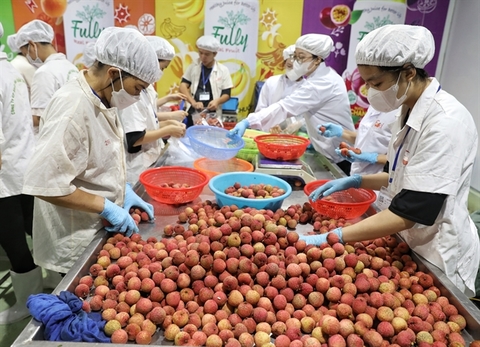
In 2023, Bắc Giang's lychees mark a significant milestone as they are exported for the first time via railway through the international intermodal station in Kép, Lạng Giang District, Bắc Giang Province. — Photo courtesy of Bắc Giang Department of Industry and Trade
With a focus on maximising competitive advantages and harnessing available resources, Bắc Giang Province aims to become a globally competitive region with a robust and sustainable export-import structure by 2030.
In a significant announcement, Phan Thế Tuấn, Vice Chairman of the People's Committee of Bắc Giang Province, unveiled a comprehensive plan designed to propel the province into a future of sustainable economic development.
Bắc Giang's ambitions are reflected in its targets for the average annual growth rate of exports and imports from the present until 2030. The province has set a challenging goal of achieving a 13-15 per cent annual growth rate for exports and a 12-14 per cent rate for imports during this period, showcasing its determination to play a pivotal role in the country’s international trade landscape.
Sector-specific development
The strategic roadmap for 2023-30 outlines sector-specific initiatives to bolster the province's economic foundations. Over the next two years, Bắc Giang plans to elevate the processing ratio of key agricultural products, leveraging their inherent production and export advantages. Simultaneously, the province will concentrate on establishing and enhancing the brand value of its agricultural products, aiming to create a distinct identity on the global stage.
Moving into the 2026-30 phase, Bắc Giang will intensify efforts towards developing high value-added products, particularly focusing on the deep processing of agricultural goods. The province's vision extends to transitioning towards medium to high-tech industries, aligning with the advancements of Industrial Revolution 4.0. This phase will also witness a concerted effort to promote high-tech industrial support products, contributing to Bắc Giang's technological development.
Tuấn emphasised the importance of market diversification to mitigate risks associated with overdependence on a single market. The province envisions maintaining a balanced and healthy bilateral trade balance while actively exploring new markets. Key focus areas include established markets such as China, South Korea, Japan, the EU, ASEAN, and Eastern Europe. Simultaneously, Bắc Giang is keen to tap into emerging markets like the United States, South America, Africa, the Middle East and beyond.

The lychee processing line of Global Food Import-Export JSC, located in Lục Ngạn District, Bắc Giang Province. — Photo courtesy of Bắc Giang Department of Industry and Trade
Strategic approach to international commitments
To achieve these goals, Bắc Giang will actively implement effective solutions for production development, ensuring a sustainable supply chain for exports. The province will also intensify efforts on market development, perfecting policies, and strengthening state management to foster fair trade, prevent trade fraud, and promote equitable commerce.
Bắc Giang's strategic positioning involves leveraging the opportunities presented by international economic integration commitments. The province aims to capitalise on free trade agreements to boost exports to major markets such as the EU, Japan, China, South Korea, the US and ASEAN. The province is also committed to exploring untapped markets, including the United States, Russia, Eastern Europe, Northern Europe, India, Africa, Latin America and the Middle East.
For markets such as Japan and South Korea, which constitute a significant proportion of the province's exports, Bắc Giang continues to maximise the benefits from both multilateral and bilateral Free Trade Agreements (FTAs). This strategic approach aims to boost exports to these markets, encompassing product categories such as textiles, electronic and computer products, wooden goods, and agricultural products.
In the context of the European market, with a focus on the EU and Russia, significant trade partners, the opportunities presented by the EU-Việt Nam Free Trade Agreement (EVFTA) and the Vietnam-Eurasian Economic Union Free Trade Agreement are substantial. Therefore, Bắc Giang concentrates on maintaining a strong foothold and expanding its market share in these regions.
Turning attention to the Americas, particularly the United States, Canada, Chile, Mexico and Peru, the province strives to consolidate and expand its exports in these markets. The emphasis on this region underscores the province's commitment to taking full advantage of the effective tariff reduction under the Comprehensive and Progressive Agreement for Trans-Pacific Partnership (CPTPP), which several participating countries follow.
Anticipating a total export-import value of over US$36.54 billion for the first 10 months of 2023, Bắc Giang foresees exports reaching nearly $19.7 billion and imports exceeding $16.9 billion. Key export items include various types of phones and components, computers, electronics, electrical equipment, and textiles. Major export destinations include China, South Korea, India, the United States and Japan.
Phạm Công Toản, Deputy Director of the Bắc Giang Department of Industry and Trade, emphasised the critical role of ensuring a stable supply of raw materials for exports. The province is set to focus on long-term export market development, especially in regions like ASEAN, Japan, South Korea, mainland China, Taiwan, Hong Kong, and Europe. Concurrently, Bắc Giang aims to enhance state management in import-export activities to combat trade fraud, contributing to the province's overall goal of sustainable growth.
Bắc Giang's resilience and support measures have earned praise from the business community. Kang Sae Na, CEO of Viet Pan Pacific World Co Ltd, a company based in Bắc Giang, noted the positive impact of provincial policies post-COVID-19. The company, specialszing in apparel exports to the EU and the US, reported stable orders and revenue of approximately VNĐ618 billion ($25.8 million) in 2022. The CEO attributed this success to the province's effective guidance, citizen cooperation, and business-friendly policies that facilitated post-pandemic recovery. — VNS